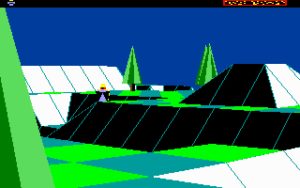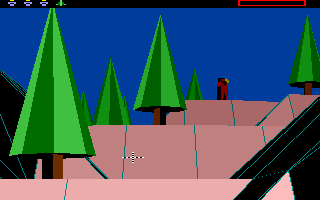The Sentinel description
We have a puzzle of the late 1980s. on the one hand, the gameplay is quite traditional for the genre: on the same principle built the stages, a fixed number of actions of the player, which does not change the entire game, the same obstacles and only one kind of enemy.
Here only it does not prevent the game to be unique in its kind, because it is in full, multicolor 3D first-person view (in 1989!), as for the stages uses procedural generation: each of the 10,000 levels stated in the guide, uniquely generated from a "seed" which is his room. In addition, it is possible to produce it in almost identical form on most platforms of the late 1990s, from a low-powered BBC Micro and ZX Spectrum up to the leaders in the Amiga and DOS in VGA mode.
The game takes place on a multi-level field, painted in checkerboard. Our hero (which the guide called "sentaida") is opposed to the Guard/Sentinel, in whose honor and named the game, and in the later stages and his assistants Guards/Guard'am. The goal of hero is to absorb the energy of a Guardian, the goal of his enemies is to remove from the field anything that is not the trees that are there originally. Guardian by default is located on the highest point of the level, and the player somewhere at the bottom, and as you will see, it is of paramount importance.
In the beginning of the game the opponents are "asleep", so take your time with action, first look around and think about a plan of action. As soon as you try to do something active, the guardians will rotate 45 degrees at a time, carefully removing all extraneous things from the sector which is in their field of vision. To change their position, they can't. The hero is also stationary, but its disposal is important superpower: he can create copies of itself and to freely teleport between them. In addition, he can create rocks and trees. All this is not free: a tree is a unity of energy that a stone or two, copy three and the beginning of the game the hero has energy sufficient to create only three copies. However, he can absorb any object on the cells (including custody), instantly receiving their energy. Opponents in the same way (only much slower) absorb foreign objects (character, copies or rocks) - and then return the received energy back, creating trees. Thus, the total energy level constant and equal to the amount obtained from the accumulated objects, and our shintaido.
And here comes the most important feature of the game: almost all of the interaction occurs not with the objects themselves, and with the field on which they are located: to deliver (and absorb) the object only if you see at least a corner of his cell. If this is not available, there is no interaction. So in the beginning you are unlikely something will eat except a couple of trees, the height of the body sentaida slightly less than the height of the level, and you can see only the cells that are below a hero or at the same height. The Guardian of this problem, of course, no, besides the natural obstacles caused by the geometry of the level, he sees everything.
So how do you play, if you can not get up? For this and serve the stones. They have a height of half level and have one very important feature: it is the only object directly accessible from any point in the level, even if the cell beneath it is not visible, only you'd seen the stone itself. So I put on the visible cell of stone on it – my copy, teleport, and voila, you see the level above, you can continue! Of course, no one will bother to put each other two, three, four stones in one fell swoop and fly higher – just energy enough. The flip side of this, however, is that the enemies of these stones are visible in the same way - and they will not be slow to drain them of energy if they happen to be in their field of vision. So as a long-term design, they don't work, is only a temporary measure. Don't forget to devour them!
Besides the "directed" teleportation in the game there is another mechanism (the manual calls it "hyperspace"). If you urgently need to get away (most common reason: you see a guard and sucks the energy), you press the jump button and the game creates a copy in a random place in the level where you and teleports. However, there are two details to consider: you are bound to lose three energy units to create a copy, and this copy is always at the same level where the protagonist, or below. If you are too low, you can easily bring yourself to a standstill when energy is not enough to get out, and take it nowhere. In this case, the attempt giperpryzhka is regarded as a suicide and the game ends. With the mentioned ability is connected and the only special ability custody, which is not you: if they can't suck energy from the hero, then try to turn the tree around. Terrified, the hero will make the hyperspace automatically (monster, however, also need to see the cage character, so if trees in the right spots no, our shintaido nothing to fear).
In General, that's all. Do you expect the moves and calmly jump in the level, collect energy, trying not to catch the eye of the enemies, and climb higher and higher. But even if you noticed, there are a few seconds to jump, and after that energy does not disappear instantly, and will lose the unity in a second, so some lead time is always there. The main thing – do not panic, do not forget to take everything and succeed!
When you get to the top and absorb the Guards, hyperspace will take you to the next level. "Next" he, however, at the time of passage, and not – all 10,000 of levels is not necessary. All the energy that you have collected will go to the forward - minus the cost of hyperspace. So if at zero, the initial level at the time of expiry you have 10 units of energy, you'll get to (0+10-3)=7 minutes. It turns the game from "almost infinite" to "conditionally walkable", though not very quickly.
The save function no – instead, on the exit card, you with the level number will get the code. Enter it next time and start from there!
Ten years later, in 1998, the game was re-called Sentinel Returns. It is no different from the original, except for upgraded graphics (not for the better, to be honest), and turns Custody in real time instead of 45-degree. It was also reduced (to 650) the number of levels.
Tired of your same old routine, want to add some entertainment and fun element in hour life? Play one of the best videogame The Sentinel online now and change your boring oold routine for good.
Source: Archive.org, Mobygames.com



